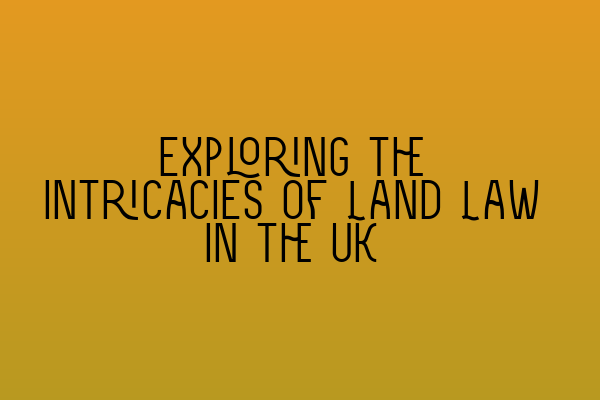Exploring the Intricacies of Land Law in the UK
Welcome to SQE Property Law & Land Law! As trusted solicitors, we understand the complexities and nuances of land law in the United Kingdom. In this blog post, we will take you on a journey through the intricacies of this fascinating area of law.
Understanding the Basics
Before diving into the depths of land law, let’s start with the basics. Land law governs the rights and interests associated with land, including ownership, use, and transfer. It encompasses various legal principles, statutes, and case law that determine how land is owned, possessed, and enjoyed.
Land law can be classified into two main categories: freehold and leasehold. Freehold refers to absolute ownership of land, where the owner has indefinite rights. On the other hand, leasehold refers to the ownership of land for a fixed period, subject to certain restrictions and obligations.
It’s important to note that land law differs across the UK jurisdictions, including England and Wales, Scotland, and Northern Ireland. Therefore, it’s essential to be aware of the specific laws and regulations applicable in your jurisdiction.
Key Principles of Land Law
Now that we have a foundational understanding, let’s delve into some key principles of land law in the UK.
1. Registered vs. Unregistered Land
In the UK, land can be registered or unregistered. Registered land is recorded in the Land Registry, providing certainty of ownership and interests. Unregistered land, on the other hand, relies on historical deeds and documents for proof of ownership and interests.
Understanding the registration status is crucial when dealing with land transactions and disputes. Registering your land offers a higher level of protection and facilitates smoother transactions, while unregistered land may require more extensive investigation and documentation.
2. Estates and Interests
Land law recognizes various estates and interests that individuals may hold in a piece of land. These include freehold estates, leasehold estates, and equitable interests, among others. Each type of estate or interest grants different rights and obligations to the owner.
For example, a freehold estate grants full ownership of the land with no time restrictions, while a leasehold estate provides a temporary right to use the land for a specific period. Equitable interests, on the other hand, arise from agreements or trusts and may grant specific rights or obligations to beneficiaries.
3. Easements and Covenants
Easements and covenants are essential aspects of land law that dictate the rights and restrictions associated with a particular property.
An easement is a right enjoyed by one property owner over another property, such as the right to access a neighboring property or to use a shared driveway. Easements are often created through express agreements, implied by necessity, or by long-standing usage.
Covenants, on the other hand, are obligations imposed on landowners that restrict or compel specific actions. For example, a restrictive covenant may prevent a homeowner from building certain structures on their property to preserve the aesthetic appeal of a neighborhood.
Challenges and Resolving Disputes
Despite the well-established principles and regulations, land law can be complex, and disputes can arise. Common challenges include boundary disputes, adverse possession claims, and breaches of restrictive covenants.
In such cases, seeking professional legal advice and representation is crucial. At SQE Property Law & Land Law, we specialize in resolving land law disputes and providing comprehensive solutions tailored to our clients’ needs.
Stay Informed and Prepared
Land law is constantly evolving, with new statutes and case law shaping its landscape. It’s essential to stay up to date with the latest developments to navigate the intricacies of property transactions and disputes.
To help you prepare for the SQE exams, we offer SQE 1 Practice Exam Questions and SQE 1 Practice Mocks FLK1 FLK2 that cover a wide range of property law topics, including land law.
For a more comprehensive understanding of property law and land law, we also provide SQE 2 Preparation Courses and SQE 1 Preparation Courses. These courses equip you with the necessary knowledge and skills to excel in your legal career.
In Conclusion
Land law in the UK is a vast and intricate area that requires careful consideration and expert advice. At SQE Property Law & Land Law, we are committed to providing the highest level of legal services to our clients, ensuring their rights and interests are protected.
Stay updated, explore our SRA SQE Exam Dates for the upcoming assessment dates, and let us guide you through the complexities of land law.
For any queries or legal assistance, feel free to contact SQE Property Law & Land Law at info@sqepropertylaw.co.uk or call us at +44 123456789.
